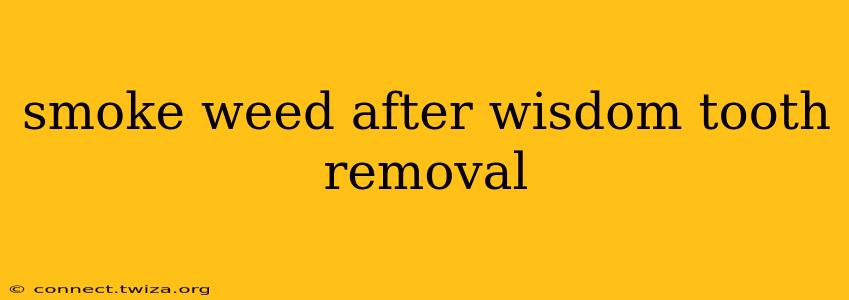Smoke Weed After Wisdom Tooth Removal? A Risky Proposition
Getting your wisdom teeth out is a significant procedure, and recovery is crucial. While many people are tempted to self-medicate with marijuana to manage pain, the risks far outweigh any potential benefits. This article explores the potential dangers of smoking weed after a wisdom tooth extraction and offers safer alternatives for managing post-operative discomfort.
Is it safe to smoke weed after wisdom tooth extraction?
The short answer is no. Smoking weed after wisdom tooth extraction is strongly discouraged by dental professionals. The act of smoking itself can disrupt the delicate blood clots forming at the extraction sites, increasing the risk of:
- Dry Socket: This painful complication occurs when the blood clot is dislodged, exposing the underlying bone and nerve endings. Smoking significantly increases the risk of dry socket, leading to prolonged pain and potential infection.
- Increased Bleeding: The sucking action involved in smoking can dislodge the clot and cause excessive bleeding.
- Infection: The mouth is teeming with bacteria, and smoking introduces more pollutants, increasing the risk of infection at the extraction sites. This can lead to serious complications requiring further treatment.
- Slower Healing: The irritants in smoke can impede the healing process, prolonging recovery time and increasing discomfort.
What are the alternatives to smoking weed for pain relief after wisdom tooth extraction?
Your dentist or oral surgeon will prescribe appropriate pain medication tailored to your needs. These are generally safe and effective when used as directed. Here are some additional strategies for managing post-operative pain:
- Prescription Pain Medication: Follow your dentist's instructions precisely regarding prescribed painkillers.
- Over-the-Counter Pain Relievers: Ibuprofen or acetaminophen (Tylenol) can help manage mild to moderate pain. Always follow dosage instructions.
- Ice Packs: Applying ice packs to your cheeks can reduce swelling and pain.
- Saltwater Rinses: Gently rinsing your mouth with warm saltwater can help keep the area clean and promote healing.
- Rest: Adequate rest is essential for proper healing.
Can I use edibles instead of smoking weed after wisdom tooth extraction?
While edibles don't involve the direct irritation of smoking, they still carry risks. The process of swallowing can disrupt the healing process and increase the chances of infection. Moreover, the unpredictable effects of edibles make managing pain and potential complications even more challenging. It's best to avoid edibles entirely during your recovery.
What are the long-term effects of smoking weed on oral health?
Beyond the immediate risks after a wisdom tooth extraction, chronic marijuana use can negatively impact oral health, increasing the risk of:
- Gum disease (periodontitis): This can lead to tooth loss.
- Dry mouth (xerostomia): Reducing saliva production increases the risk of cavities and infections.
- Oral cancer: Studies suggest a link between marijuana smoking and increased oral cancer risk.
Will smoking weed help with the pain after wisdom teeth removal?
While marijuana might offer temporary pain relief, the risks associated with smoking it after a wisdom tooth extraction significantly outweigh any potential benefits. It's crucial to prioritize your health and follow your dentist's post-operative instructions.
In Conclusion:
Prioritizing your oral health during recovery is paramount. Avoid smoking weed or using edibles after a wisdom tooth extraction, and instead focus on the safe and effective pain management strategies recommended by your dentist. This will significantly reduce your risks and ensure a smoother, faster recovery. Remember, your dentist is the best resource for guidance on post-operative care.
